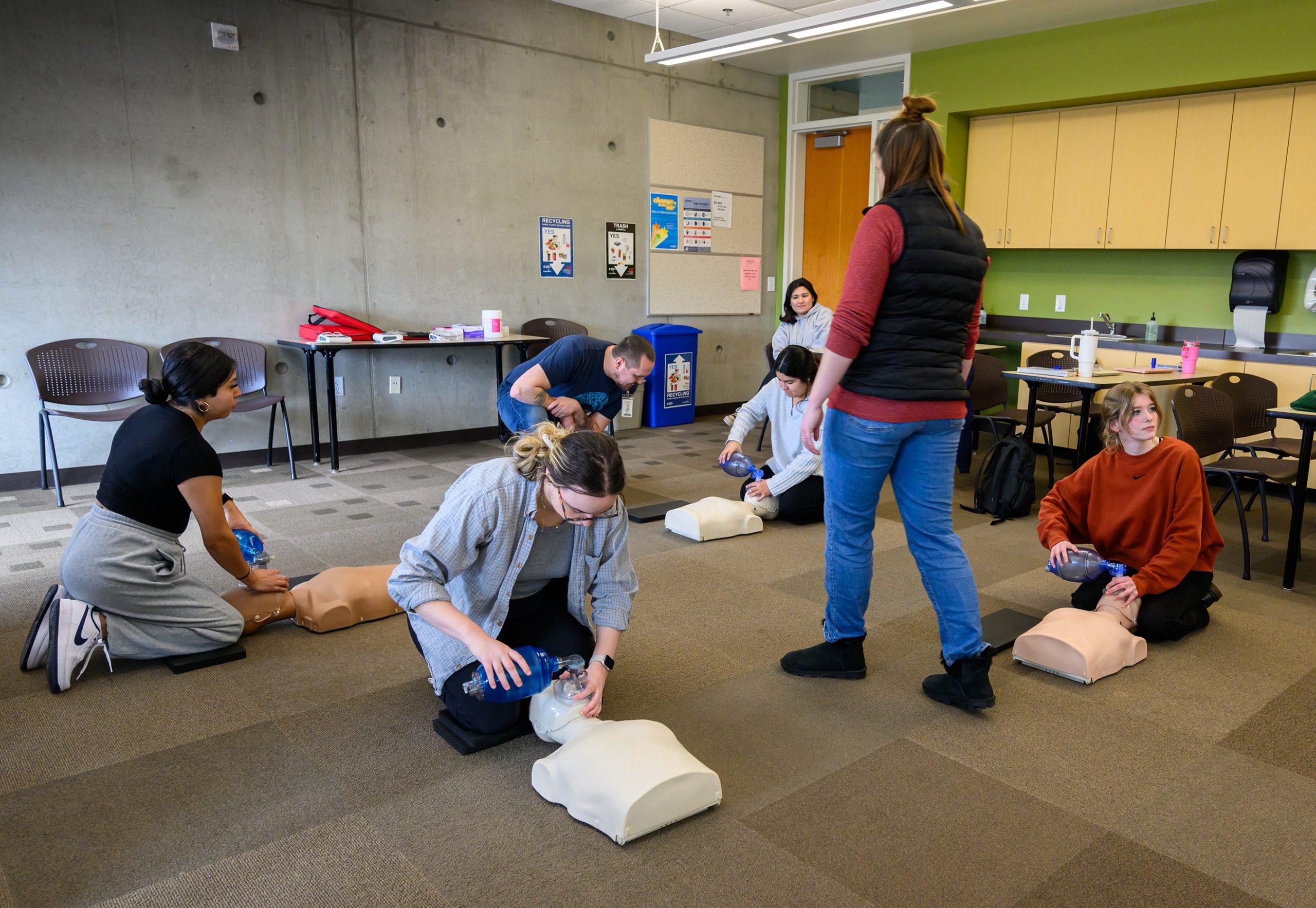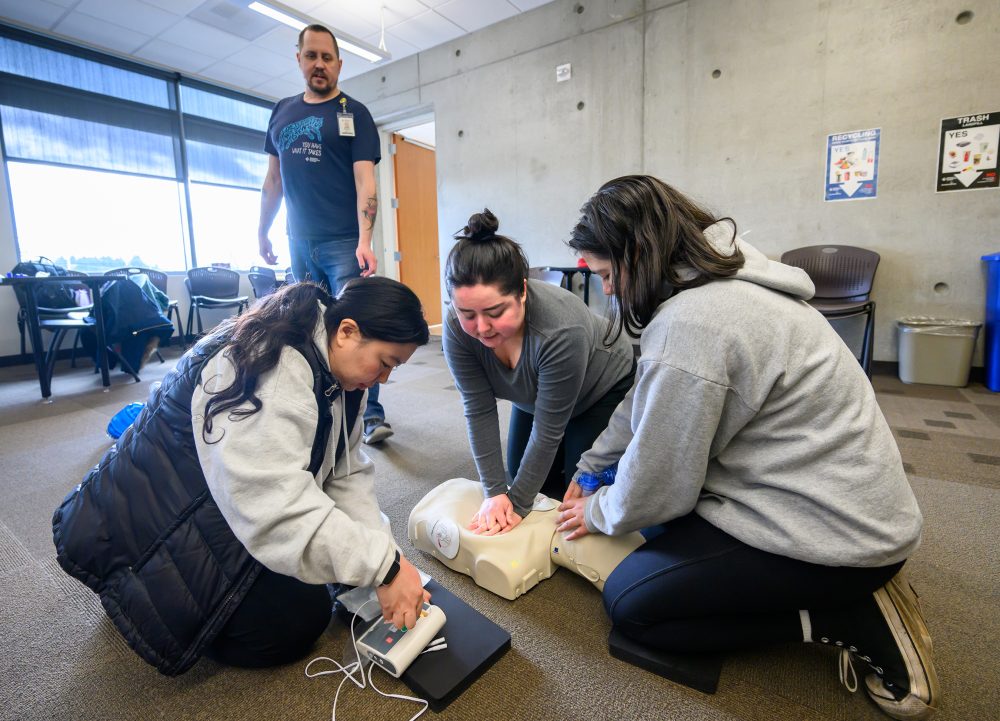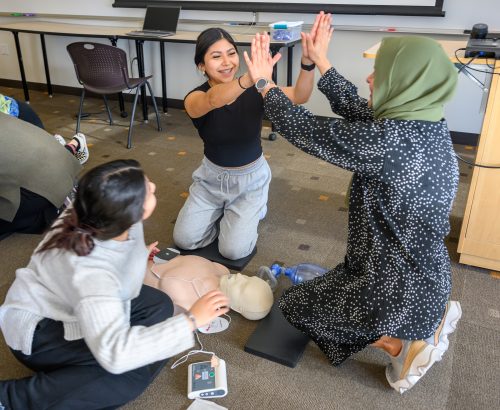CTE Month: Healthcare Careers Certificate provides a head start for high school students
Story by Misty Bouse. Photos by Ric Getter.
Portland Community College is tackling the nation’s healthcare worker shortage head-on with an innovative certificate that equips high school students with the essential, cutting-edge skills needed to excel in today’s fast-evolving medical landscape.
The healthcare industry in the United States is experiencing a severe shortage of workers driven by the medical needs of an aging population. And, the industry is expected to add jobs over the next decade — 1.6 million jobs through 2033, which is about 24% of all new jobs in the economy.
To help meet this demand, Portland Community College is offering the Healthcare Careers Certificate for high school students enrolled in two dual credit programs. The Jefferson High School Middle College for Advanced Studies and the Hillsboro Independent School District Early College dual credit programs have about 25-30 students taking the certificate. Graduates earn a high school diploma and college credits, but also a healthcare certificate that demonstrates their readiness for employment in the healthcare industry.

It’s CTE Month!
Community colleges like PCC are committed to filling high-demand jobs in their communities with the skills and training necessary for success in industries. Community colleges are strong partners to local business and industry, utilizing workforce professionals to guide programs through advisory committees.
“This offers a unique exposure to healthcare at no direct cost to students. They can earn a 14-credit certificate that prepares them with the foundational skills employers require for entry-level positions in the healthcare industry,” said Hailey Lofdahl, faculty member and Medical Professions chair. “It also introduces students to the breadth of career opportunities available, informing and preparing them to continue their education.”
She adds that the program equips students with essential knowledge and hands-on skills for entry-level healthcare roles. In addition to technical training, students develop soft skills such as teamwork, time management, problem-solving and communication. They also gain experience in health information management and terminology, providing them with a competitive edge in the workforce.
“Many students plan to pursue pre-med, biomedical engineering, or nursing, and the certificate helps them make more informed decisions about their college majors too,” said Lofdahl. “PCC’s Healthcare Careers Certificate has already led to employment in diverse healthcare roles. Our graduates are currently in emergency room technicians, central sterile processing, medical translators, transcriptionists, surgical techs and patient access specialists. Some bilingual students have worked as medical interpreters while continuing studies.”
Flexible Classes
Students take both online and in-person classes, beginning with healthcare career essentials, which covers foundational knowledge and soft skills such as interpersonal communication, conflict resolution, patient de-escalation and constructive feedback. Another key course is medical terminology, where students gain an in-depth understanding of medical language, including anatomy, physiology, pathology, diagnostic procedures and treatment protocols. Curriculum in the provider CPR/AED first aid and bloodborne pathogens course includes certifications from the American Heart Association.
Additional coursework includes healthcare law and ethics, which covers HIPAA compliance, patient confidentiality and proper documentation. Students also have the option to take healthcare delivery systems—an online course that builds proficiency in systems and patient data management. For those interested in medications, the elective pharmacology for Allied Health provides foundational knowledge on drug uses, dosages and potential side effects.
“We have former students who are training to be medical assistants, health and emergency professionals, physician assistants and nurses, or are enrolled in other competitive programs,” said Lofdahl. “Some go on to pursue a bachelor’s degree.”
Employability Is Key
Completion of the certificate, which takes about two to three terms, on average, generally leads to immediate employability. Many graduates enter the workforce right after high school, while others use the certificate to gain experience while pursuing higher education.
With medical and dental employers advising on their needs and eager to hire skilled professionals, this program opens doors to a range of promising career paths. This opportunity is open to high school students at both Jefferson High School Middle College and those in the Hillsboro Independent School District’s Early College.
For more information, visit the Medical Professions webpage.


